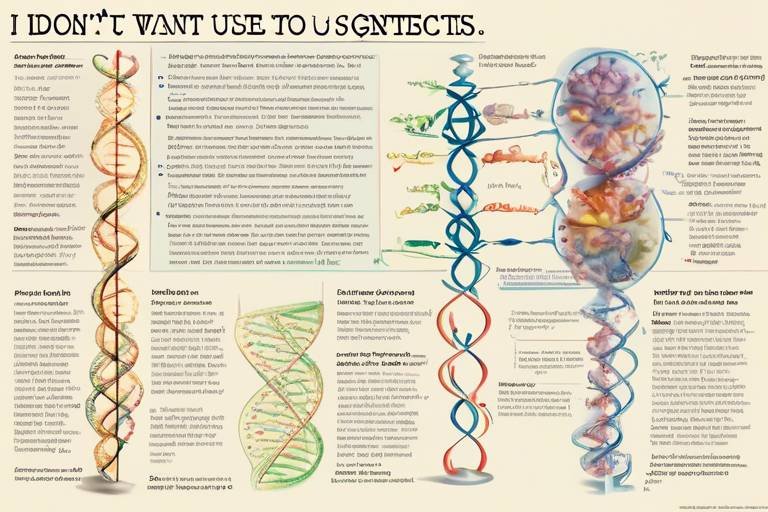Does Philosophy Have a Place in Science Education?
In an era where science drives our understanding of the universe, one might wonder: does philosophy still have a role to play in science education? The answer is a resounding yes! Philosophy and science are intertwined in ways that can enrich the educational experience, fostering not just knowledge but also critical thinking and ethical reasoning. By exploring the philosophical underpinnings of scientific inquiry, students can gain a deeper appreciation for the methods and assumptions that shape scientific knowledge. This article dives into how integrating philosophy into science education can enhance learning outcomes and prepare students for the complexities of the modern world.
Philosophy critically examines the foundations, methods, and implications of science. It challenges students to explore questions such as: What constitutes scientific knowledge? and How do we distinguish science from non-science? By engaging with these questions, students learn to appreciate the nature of scientific inquiry and the assumptions that underlie scientific theories. For instance, consider the concept of falsifiability proposed by philosopher Karl Popper. This principle encourages students to understand that for a theory to be scientific, it must be testable and potentially disprovable. Such philosophical insights not only clarify the scientific process but also empower students to think critically about the information presented to them.
Integrating philosophy into science education is like adding a turbocharger to an engine—it supercharges critical thinking skills! When students are encouraged to analyze arguments, question assumptions, and evaluate evidence, they become more adept at navigating the complexities of scientific contexts. For example, in a classroom discussion about climate change, students can explore various philosophical arguments surrounding causation and responsibility. This not only enhances their analytical skills but also equips them with the tools to engage in informed debates about pressing global issues.
Philosophical discussions about ethics in science education are crucial, especially as we face rapid advancements in technology and medicine. Students must consider the moral implications of scientific discoveries and the responsibilities of scientists in society. Are we prepared to handle the ethical dilemmas posed by genetic engineering or artificial intelligence? By instilling a strong ethical foundation through philosophical inquiry, educators can help students navigate these challenging questions. For instance, a case study on CRISPR technology can lead to rich discussions about the potential benefits and risks, allowing students to weigh the ethical considerations involved.
Understanding the historical relationship between philosophy and science reveals how philosophical ideas have shaped scientific progress. From Aristotle's natural philosophy to the Enlightenment's emphasis on reason, these philosophical movements have laid the groundwork for modern scientific methods. By studying these historical contexts, students can appreciate the evolution of scientific thought and recognize that science is not just a collection of facts but a dynamic field influenced by philosophical inquiry.
The philosophy of science delves into key concepts such as hypothesis testing, theory confirmation, and the demarcation problem. By examining these concepts, students gain a deeper understanding of scientific practices. For example, discussions about the demarcation problem—what separates science from pseudoscience—can help students critically evaluate claims they encounter in everyday life. This philosophical lens not only enriches their scientific education but also cultivates a sense of skepticism that is invaluable in today's information-rich environment.
Combining philosophy with science promotes interdisciplinary learning, encouraging students to draw connections between different fields. Imagine a student studying environmental science who also engages with ethical theories—this combination can lead to a more holistic understanding of environmental issues. By recognizing the broader implications of scientific inquiry, students become well-rounded thinkers capable of addressing complex global challenges.
Incorporating philosophical inquiry into science classrooms can stimulate engaging discussions. Picture a vibrant classroom where students are encouraged to explore complex questions such as: What is the nature of scientific truth? or How do societal values influence scientific research? These discussions allow students to develop their own viewpoints on scientific issues, fostering a sense of ownership over their learning. Moreover, such an environment nurtures collaboration and respect for diverse perspectives, essential skills in an increasingly interconnected world.
Utilizing case studies that highlight philosophical dilemmas in science provides practical examples of how philosophy informs scientific practice. For instance, examining the ethical implications of vaccine distribution during a pandemic can lead to profound discussions about equity and justice in healthcare. These real-world applications not only make philosophical concepts more relatable but also demonstrate their relevance in contemporary scientific practice.
Finally, evaluating students' understanding of philosophical concepts in relation to science can help educators gauge the effectiveness of integrating philosophy into science education. Assessments can take various forms, from reflective essays to group discussions, allowing students to articulate their understanding and engage with the material on a deeper level. This not only reinforces their learning but also highlights the importance of philosophy in shaping informed scientists and responsible citizens.
- Why is philosophy important in science education? Philosophy encourages critical thinking, ethical reasoning, and a deeper understanding of scientific methods.
- How can teachers integrate philosophy into science lessons? Teachers can incorporate philosophical discussions, case studies, and reflective assessments into their curriculum.
- What are some examples of philosophical questions in science? Questions about the nature of scientific truth, the ethics of scientific research, and the demarcation of science from pseudoscience are great starting points.

The Role of Philosophy in Science
This article explores the intersection of philosophy and science education, examining how philosophical inquiry can enhance scientific understanding, critical thinking, and ethical considerations in the learning process.
Philosophy plays a crucial role in shaping our understanding of science. It is not just a collection of abstract ideas; rather, it serves as the foundation upon which scientific inquiry is built. By critically examining the foundations, methods, and implications of scientific practices, philosophy helps students grasp the essence of what science is all about. Have you ever wondered why certain scientific theories are accepted while others are dismissed? This is where philosophy steps in, illuminating the assumptions and principles that drive scientific thought.
For instance, consider the concept of falsifiability, proposed by philosopher Karl Popper. This principle asserts that for a theory to be considered scientific, it must be testable and potentially disprovable. By integrating such philosophical ideas into science education, students can appreciate the rigorous standards that separate scientific claims from mere speculation. They learn that science is not just about collecting data; it’s about asking the right questions and being open to challenging established beliefs.
Moreover, philosophy encourages students to engage in metacognition, or thinking about their own thinking. This self-reflective process is vital in science, where students must evaluate their own biases and assumptions. For example, when studying climate change, students can benefit from philosophical discussions regarding the ethical implications of their findings. This not only enhances their scientific literacy but also prepares them to become responsible citizens who can navigate the complex moral landscapes shaped by scientific advancements.
In essence, the role of philosophy in science education can be summarized as follows:
- It provides a framework for understanding scientific inquiry.
- It promotes critical analysis of scientific theories and methods.
- It fosters ethical considerations in scientific practices.
By embracing the philosophical dimensions of science, educators can create a rich learning environment that empowers students to become not just consumers of scientific knowledge, but also thoughtful contributors to scientific discourse. This holistic approach ensures that students are well-equipped to tackle the challenges of an ever-evolving scientific landscape.
Q: How does philosophy enhance scientific understanding?
A: Philosophy enhances scientific understanding by providing critical frameworks for analyzing scientific methods, questioning assumptions, and evaluating evidence.
Q: Can philosophy help in ethical decision-making in science?
A: Yes, philosophical discussions about ethics encourage students to consider the moral implications of scientific discoveries and the responsibilities of scientists.
Q: What is the significance of historical perspectives in philosophy and science?
A: Historical perspectives reveal how philosophical ideas have shaped scientific progress, allowing students to appreciate the evolution of scientific methods over time.

Enhancing Critical Thinking Skills
Integrating philosophy into science education is like adding a turbocharger to an already powerful engine; it enhances performance and efficiency in ways that are both profound and transformative. When students engage with philosophical concepts, they are not just memorizing facts; they are learning to think critically and analytically. This shift from rote learning to active engagement is crucial in today's fast-paced, information-rich environment.
Critical thinking skills are essential for students as they navigate the complexities of scientific inquiry. By questioning assumptions, analyzing arguments, and evaluating evidence, students develop a toolkit that empowers them to tackle real-world problems. For instance, when faced with a scientific claim, students can ask themselves:
- What evidence supports this claim?
- Are there any biases that might affect the interpretation of this evidence?
- What alternative explanations could exist?
This kind of questioning fosters a deeper understanding of scientific concepts and encourages students to become more discerning consumers of information. Imagine a student tasked with evaluating climate change data. With a philosophical lens, they can dissect the methodologies used in studies, scrutinize the underlying assumptions, and weigh the ethical implications of different scientific approaches. This process not only enhances their scientific literacy but also cultivates a sense of responsibility towards the information they consume and share.
Moreover, philosophy encourages students to embrace uncertainty and complexity. In science, not every question has a clear-cut answer, and many theories are subject to revision. By grappling with philosophical inquiries, students learn to appreciate the nuances of scientific debates and the importance of ongoing inquiry. This mindset is invaluable, as it prepares them for a world where critical thinking and adaptability are paramount.
Incorporating philosophical discussions into the science curriculum also creates a vibrant classroom environment. Students are encouraged to express their thoughts, challenge each other's viewpoints, and engage in constructive debates. This collaborative atmosphere not only enhances critical thinking but also builds communication skills that are essential in any field. When students learn to articulate their ideas clearly and listen to opposing views, they become better equipped to engage in scientific discourse.
In conclusion, the integration of philosophy into science education is a powerful strategy for enhancing critical thinking skills. By fostering a culture of inquiry, questioning, and debate, we prepare students not just to understand science, but to engage with it meaningfully and ethically. As educators, it is our responsibility to equip the next generation with the skills they need to navigate an increasingly complex world.
- Why is critical thinking important in science education?
Critical thinking is vital because it enables students to analyze information, question assumptions, and make informed decisions based on evidence. - How can philosophy be integrated into science classes?
Philosophy can be integrated through discussions, case studies, and encouraging students to reflect on the ethical implications of scientific discoveries. - What are some examples of philosophical questions relevant to science?
Examples include inquiries about the nature of scientific theories, the ethical responsibilities of scientists, and the implications of scientific advancements on society.

Ethics and Science Education
When we think about science, we often picture laboratories, test tubes, and complex equations. However, lurking behind those formulas and experiments is a crucial element that doesn't always get the spotlight it deserves: ethics. The integration of ethics into science education is not just an add-on; it’s a fundamental aspect that shapes how future scientists approach their work and the world around them. So, why should we care about ethics in science? Well, imagine a world where scientific discoveries are made without considering their impact on society. It's a bit like handing a child a box of fireworks without explaining the dangers—exciting, but potentially disastrous!
Ethics in science education encourages students to grapple with the moral implications of their research. For instance, consider the ethical dilemmas surrounding genetic engineering. Should we edit the genes of unborn babies? What about the potential consequences of creating genetically modified organisms? These questions aren't just theoretical; they require students to engage in deep philosophical inquiry, weighing the benefits against the potential risks. By fostering this kind of critical thinking, we prepare students to not only be competent scientists but also responsible citizens.
Moreover, discussing ethics in science helps students understand the responsibilities that come with scientific advancement. Scientists wield significant power, and with that power comes the duty to use it wisely. This is where philosophical discussions become invaluable. They prompt students to reflect on questions like:
- What responsibilities do scientists have to society?
- How should scientific knowledge be shared with the public?
- What are the ethical boundaries in conducting research?
These questions can lead to rich classroom discussions, allowing students to explore various viewpoints and develop their own ethical frameworks. Incorporating real-world examples—such as the debates surrounding climate change research or animal testing—can make these discussions even more engaging. When students see the tangible consequences of scientific decisions, they’re more likely to appreciate the importance of ethics in their future careers.
In addition, teaching ethics in science education can help cultivate a culture of integrity. By emphasizing the importance of honesty and transparency in research, we can help prevent issues like data falsification and plagiarism. Ultimately, an ethical foundation in science education not only shapes better scientists but also fosters a more ethical society. As we equip students with the tools to navigate complex moral landscapes, we prepare them to make informed decisions that benefit humanity as a whole.
So, the next time you ponder the role of ethics in science, remember that it’s not just about avoiding pitfalls; it’s about enriching the scientific journey. It’s about ensuring that as we push the boundaries of knowledge, we do so with a keen awareness of our responsibilities to each other and to the planet. In this way, ethics and science education are not just intertwined; they are essential partners in fostering a future where scientific progress aligns with the greater good.
- Why is ethics important in science education?
Ethics is crucial in science education because it helps students understand the moral implications of their work and encourages responsible conduct in their future careers. - How can educators incorporate ethics into science lessons?
Educators can incorporate ethics into science lessons by discussing real-world dilemmas, using case studies, and facilitating debates on controversial topics. - What are some examples of ethical dilemmas in science?
Examples include genetic modification, climate change research, and the use of animals in experiments.

Historical Perspectives
The relationship between philosophy and science is as old as the disciplines themselves, intertwining through centuries of intellectual exploration. In the early days, philosophers were the original scientists—think of Aristotle, who laid the groundwork for scientific inquiry with his observations of the natural world. His work exemplifies how philosophical thought can lead to scientific discovery, as he sought to understand the "why" behind the phenomena he observed. This historical intertwining is not merely a relic of the past; it is a testament to the enduring relevance of philosophical inquiry in shaping scientific thought.
As time progressed, the Enlightenment era marked a significant shift, where reason and empirical evidence began to take center stage. Philosophers like Descartes and Locke emphasized the importance of doubt and questioning as foundational to knowledge. This period saw the birth of the scientific method, which is essentially a philosophical framework for inquiry. The interplay between these two realms fostered a culture of skepticism and inquiry that is vital in modern science education.
Moreover, the historical perspectives on philosophy's role in science reveal a pattern of evolution. For instance, during the 19th century, figures like Karl Popper introduced the concept of falsifiability as a demarcation criterion for scientific theories. This philosophical lens encouraged scientists to rigorously test their hypotheses, fundamentally altering how scientific inquiry was approached. The philosophy of science became a critical component in understanding not just what science is, but how it operates and evolves.
To illustrate this historical journey, consider the following table that highlights key philosophers and their contributions to scientific thought:
| Philosopher | Contribution | Era |
|---|---|---|
| Aristotle | Foundational observations of natural phenomena | 4th Century BC |
| Descartes | Emphasis on reason and skepticism | 17th Century |
| Locke | Theory of knowledge and empiricism | 17th Century |
| Popper | Falsifiability as a criterion for scientific theories | 20th Century |
These historical insights not only enrich our understanding of science but also highlight the necessity of philosophical inquiry in education. By examining the past, students can appreciate how philosophical debates have shaped scientific methodologies and ethical considerations. This awareness fosters a deeper understanding of the scientific process, urging them to ask critical questions about the assumptions that underpin their learning.
In essence, the historical perspectives on the interplay between philosophy and science serve as a reminder of the importance of asking "why." This inquiry not only enhances scientific understanding but also cultivates a mindset that values critical thinking, ethical considerations, and a holistic view of knowledge—qualities that are essential in today's complex world.
- How does philosophy enhance scientific understanding? Philosophy encourages critical thinking and helps students question the foundations of scientific theories, leading to a deeper comprehension of scientific concepts.
- What role does ethics play in science education? Ethical discussions in science education prompt students to consider the societal implications of scientific discoveries and the responsibilities that come with them.
- Can philosophy and science coexist in the classroom? Absolutely! Integrating philosophy into science education promotes interdisciplinary learning and fosters engaging discussions about complex scientific issues.

Philosophy of Science
The is a fascinating area that delves into the fundamental principles and concepts that underpin scientific practice. It examines crucial topics such as hypothesis testing, theory confirmation, and the demarcation problem—essentially asking, "What really distinguishes science from non-science?" This inquiry not only provides clarity on scientific methods but also encourages students to think critically about the nature of knowledge itself. Imagine trying to navigate a vast ocean without a compass; the philosophy of science serves as that compass, guiding students through the sometimes murky waters of scientific inquiry.
One of the key aspects of the philosophy of science is its focus on hypothesis testing. This involves formulating hypotheses that can be tested and potentially falsified. By understanding this process, students learn that science is not just about proving ideas right; it’s often about proving them wrong. This critical perspective fosters a culture of skepticism and inquiry, encouraging students to question everything, including their own assumptions. For instance, consider the classic scientific method: form a hypothesis, conduct experiments, analyze data, and draw conclusions. But what happens when the results don’t align with the hypothesis? This is where philosophical inquiry becomes essential, as it prompts students to reevaluate their methodologies and assumptions.
Another significant concept is theory confirmation. How do scientists confirm that a theory is valid? What criteria must be met for a theory to be accepted in the scientific community? The philosophy of science encourages students to explore these questions, helping them understand that scientific consensus is often a complex interplay of evidence, peer review, and theoretical frameworks. This understanding can lead to a more nuanced appreciation of scientific debates and controversies, such as climate change or genetic engineering. Students who grasp these philosophical underpinnings are better equipped to engage in informed discussions about these critical issues.
Moreover, the demarcation problem—the challenge of distinguishing between science and non-science—plays a pivotal role in the philosophy of science. This issue is particularly relevant in today's world, where pseudoscience and misinformation can easily spread. By exploring this topic, students gain the tools to critically evaluate claims and discern credible scientific information from dubious sources. They learn to ask questions like: "What evidence supports this claim?" or "Is this theory testable?" Such inquiries not only sharpen their analytical skills but also empower them to become discerning consumers of information in an age of overwhelming data.
Incorporating the philosophy of science into the curriculum can transform the way students perceive science. It encourages them to see science not just as a collection of facts and figures but as a dynamic process filled with inquiry, debate, and ethical considerations. By fostering a deep understanding of these philosophical concepts, we prepare students not only to become effective scientists but also responsible citizens who can engage thoughtfully with the world around them.
- What is the philosophy of science?
The philosophy of science is the study of the assumptions, foundations, and implications of science, focusing on how scientific knowledge is constructed and validated. - Why is critical thinking important in science education?
Critical thinking allows students to analyze arguments, question assumptions, and evaluate evidence, which is essential for understanding and conducting scientific research. - How does philosophy contribute to ethical considerations in science?
Philosophy encourages discussions about the moral implications of scientific work, helping students understand the responsibilities that come with scientific discovery. - Can philosophy enhance scientific inquiry?
Yes, integrating philosophy into science education fosters a deeper understanding of scientific methods and encourages a culture of inquiry and skepticism.

Interdisciplinary Learning
Interdisciplinary learning is like a vibrant tapestry, weaving together threads from different fields to create a rich and colorful educational experience. When we merge philosophy with science, we open the door to a world where students can explore complex ideas and draw connections that might otherwise remain hidden. Think of it as a bridge connecting two islands of knowledge, allowing students to traverse the waters of understanding with ease. This approach not only enriches their learning but also equips them with the tools to tackle real-world problems.
By integrating philosophy into science education, we encourage students to think beyond the confines of traditional subjects. They begin to see science not merely as a collection of facts and figures but as a dynamic field that is influenced by ethical considerations, historical context, and philosophical inquiry. For example, when students study the scientific method, they can also explore the philosophical questions surrounding empiricism and rationalism. This dual perspective allows them to appreciate the nuances of scientific inquiry and the implications of scientific advancements on society.
Moreover, interdisciplinary learning fosters creativity and innovation. When students are encouraged to draw from various disciplines, they can develop unique solutions to complex problems. Imagine a student who combines principles of physics with ethical considerations from philosophy to address environmental issues. This kind of thinking not only enhances their problem-solving skills but also prepares them to become responsible and informed citizens who can navigate the challenges of the future.
Incorporating interdisciplinary learning in the classroom can take many forms. Teachers might employ collaborative projects that require students to engage with both scientific concepts and philosophical discussions. For instance, a project on climate change could involve not only the scientific data regarding its effects but also a philosophical debate on the ethical responsibilities we hold towards future generations. This holistic approach encourages students to engage deeply with the material, promoting a more profound understanding of both fields.
As we look to the future of education, it is clear that fostering interdisciplinary learning is essential. By encouraging students to explore the connections between philosophy and science, we are not just teaching them to memorize facts; we are empowering them to think critically, act ethically, and innovate boldly. In this way, we prepare them to thrive in a complex world where knowledge is interconnected, and the challenges we face require a multifaceted approach.
- What is interdisciplinary learning?
Interdisciplinary learning involves integrating knowledge and methods from different disciplines to enhance understanding and problem-solving skills. - How does philosophy enhance science education?
Philosophy encourages critical thinking, ethical reasoning, and a deeper understanding of the assumptions underlying scientific inquiry. - Can interdisciplinary learning improve student engagement?
Yes! By connecting subjects, students find more relevance in their studies, leading to increased motivation and engagement. - What are some examples of interdisciplinary projects?
Projects could include studying climate change through scientific data and ethical discussions, or exploring the implications of artificial intelligence in both technological and philosophical contexts.

Philosophical Inquiry in the Classroom
Incorporating philosophical inquiry into the science classroom is like adding a splash of color to a black-and-white painting; it brings vibrancy and depth to the learning experience. Imagine students not just memorizing facts but actively engaging with the material, questioning the very nature of what they’re learning. This approach encourages them to explore complex questions that often lie at the intersection of science and philosophy. For instance, when discussing topics like climate change or genetic engineering, students can delve into the ethical implications of these scientific advancements. They can ask questions such as, “What responsibilities do scientists have towards society?” or “How do we determine what is considered ethical in scientific research?” This kind of inquiry fosters a more profound understanding of the subject matter, prompting students to think critically and reflectively.
Moreover, philosophical discussions can stimulate engaging dialogues among students, allowing them to express their thoughts and challenge each other's viewpoints. This dialogue can take place in various formats, such as group discussions, debates, or Socratic seminars, where students learn to articulate their ideas clearly and listen to opposing perspectives. By doing so, they not only enhance their communication skills but also develop a sense of respect for differing opinions. Consider a classroom scenario where students are divided into groups to discuss the implications of artificial intelligence. Each group could represent different philosophical perspectives, such as utilitarianism, deontology, or virtue ethics. This would not only deepen their understanding of the topic but also encourage them to appreciate the complexity of ethical decision-making in science.
To effectively incorporate philosophical inquiry, educators can utilize various strategies. Here are some key approaches:
- Case Studies: Present real-world scenarios that pose ethical dilemmas, encouraging students to analyze and discuss potential outcomes.
- Role-Playing: Allow students to take on different philosophical viewpoints and argue their positions, fostering empathy and understanding.
- Reflective Journals: Encourage students to keep journals where they reflect on their thoughts and feelings about the scientific topics discussed in class.
In addition to these strategies, it’s essential for teachers to create a safe and inclusive environment where students feel comfortable expressing their thoughts. This can be achieved by establishing ground rules for discussions, such as respecting differing opinions and encouraging constructive criticism. When students feel safe to explore their ideas, they are more likely to engage deeply with the material and develop a love for learning.
Ultimately, integrating philosophical inquiry into science education not only enriches the curriculum but also prepares students for the complexities of the real world. It equips them with the skills to think critically, make informed decisions, and consider the broader implications of scientific advancements. As they navigate through these philosophical landscapes, they are not just learning science; they are becoming responsible and thoughtful citizens capable of contributing meaningfully to society.

Case Studies and Examples
When we think about the role of philosophy in science education, it's essential to explore real-world case studies that illuminate how philosophical inquiry can shape scientific understanding. One striking example is the ethical debates surrounding genetic engineering. In the classroom, students can engage with questions like: "Should we edit the genes of unborn children?" This not only sparks a vibrant discussion but also encourages students to weigh the scientific possibilities against moral implications. By analyzing historical cases, such as the controversy over CRISPR technology, students can see firsthand how philosophical perspectives influence scientific practices and public policy.
Another compelling case study is the exploration of climate change. Here, philosophy plays a pivotal role in addressing the ethical responsibilities of scientists and policymakers. Students can delve into the philosophical underpinnings of climate justice, examining questions such as: "Who is responsible for the effects of climate change?" This inquiry can lead to discussions about equity, responsibility, and the role of scientific evidence in shaping societal norms. By using real data and case studies from climate science, students can better understand the intersection of ethics and scientific inquiry.
Additionally, consider the historical evolution of scientific theories, such as the shift from Newtonian physics to Einstein's theory of relativity. This transition wasn't just a scientific revolution; it was also a philosophical one. Students can explore how philosophical concepts like relativism and the nature of truth influenced scientific thought. By engaging with these case studies, students not only learn about scientific advancements but also develop critical thinking skills that allow them to question and evaluate the very foundations of scientific inquiry.
Incorporating these case studies into the curriculum can be highly beneficial. For instance, educators can create a table that outlines various case studies alongside their philosophical implications, making it easier for students to draw connections:
| Case Study | Philosophical Questions | Scientific Implications |
|---|---|---|
| Genetic Engineering | Should we edit genes? What are the ethical boundaries? | Possibilities of disease eradication vs. potential misuse. |
| Climate Change | Who is responsible for climate action? How do we ensure justice? | Impact of policy decisions on future generations. |
| Relativity Theory | What is the nature of truth? How do perceptions shape reality? | Understanding the universe beyond classical mechanics. |
By utilizing these case studies and engaging in philosophical discussions, students can develop a more nuanced understanding of science. They learn that science is not just about facts and figures but is deeply intertwined with ethical considerations and philosophical inquiry. This holistic approach not only enriches their education but prepares them to be thoughtful, responsible citizens in a world where science and ethics collide.
- Why is philosophy important in science education? Philosophy helps students understand the underlying assumptions and ethical implications of scientific inquiry, fostering critical thinking.
- Can philosophy improve scientific literacy? Yes, by integrating philosophical discussions, students can better analyze scientific arguments and evidence.
- What are some examples of philosophical dilemmas in science? Examples include debates on genetic engineering, climate change ethics, and the nature of scientific truth.

Assessment of Philosophical Understanding
Assessing students' understanding of philosophical concepts in relation to science is crucial for educators aiming to integrate philosophy effectively into science education. It's not just about knowing facts or theories; it's about grasping the underlying principles that guide scientific inquiry. But how do we measure this understanding? Traditional assessments like multiple-choice tests may fall short when it comes to evaluating philosophical comprehension. Instead, educators should consider a variety of assessment methods that encourage deeper engagement with the material.
One effective approach is through open-ended questions that require students to articulate their thoughts on philosophical dilemmas related to scientific practices. For instance, asking students to discuss the ethical implications of genetic engineering can reveal their ability to analyze complex issues and understand different perspectives. Furthermore, group discussions can be a powerful tool for assessment. By observing students as they debate and reason through philosophical questions, educators can gain insight into their critical thinking skills and their ability to engage with philosophical concepts in a scientific context.
Another assessment method involves reflective essays. Students can be tasked with writing essays that connect philosophical theories to scientific practices they have studied. This not only assesses their understanding but also encourages them to synthesize information and express their viewpoints. A rubric can be employed to evaluate these essays, focusing on clarity of thought, depth of analysis, and the ability to connect philosophical ideas to scientific issues.
| Assessment Method | Description | Benefits |
|---|---|---|
| Open-Ended Questions | Questions that require students to explain their reasoning and perspectives. | Encourages critical thinking and deep engagement. |
| Group Discussions | Facilitated conversations around philosophical dilemmas in science. | Promotes collaborative learning and diverse viewpoints. |
| Reflective Essays | Essays connecting philosophical theories to scientific practices. | Supports synthesis of knowledge and personal expression. |
Incorporating these diverse assessment methods not only enriches the learning experience but also provides a comprehensive view of how well students grasp the philosophical dimensions of science. Ultimately, the goal is to cultivate a classroom environment where students feel empowered to question, analyze, and engage with both scientific and philosophical ideas. This approach not only enhances their educational journey but also prepares them for the complex ethical landscapes they will navigate as future scientists.
- Why is philosophy important in science education? Philosophy helps students understand the foundational principles of scientific inquiry and encourages critical thinking.
- How can I incorporate philosophy into my science curriculum? Consider using open-ended questions, group discussions, and reflective essays to engage students with philosophical concepts.
- What are some examples of philosophical dilemmas in science? Issues like genetic engineering, climate change ethics, and the implications of artificial intelligence can serve as rich discussion topics.
- How can I assess students' philosophical understanding? Use a mix of open-ended questions, group discussions, and reflective essays to gauge their comprehension effectively.
Frequently Asked Questions
- What is the role of philosophy in science education?
Philosophy plays a crucial role in science education by critically examining the foundations, methods, and implications of scientific inquiry. It helps students understand the underlying assumptions of scientific theories and encourages them to think deeply about the nature of science itself.
- How does philosophy enhance critical thinking skills in students?
Integrating philosophy into science education fosters critical thinking by enabling students to analyze arguments, question assumptions, and evaluate evidence more effectively. It encourages a mindset that values inquiry and skepticism, essential for scientific exploration.
- Why is ethics important in science education?
Ethics is vital in science education as it prompts students to consider the moral implications of scientific discoveries. Philosophical discussions about ethics help students understand the responsibilities of scientists and the impact their work can have on society and the environment.
- Can you explain the historical relationship between philosophy and science?
Understanding the historical relationship between philosophy and science reveals how philosophical ideas have significantly shaped scientific progress. Many scientific methods and concepts were developed through philosophical inquiry, showcasing the intertwined nature of both fields over time.
- What is the philosophy of science?
The philosophy of science examines key concepts such as hypothesis testing, theory confirmation, and the demarcation problem. It provides students with a deeper understanding of scientific practices and the principles that guide scientific inquiry.
- How does combining philosophy with science promote interdisciplinary learning?
Combining philosophy with science encourages interdisciplinary learning by helping students draw connections between different fields. This broader perspective allows them to appreciate the implications of scientific inquiry beyond the confines of traditional scientific disciplines.
- How can philosophical inquiry be incorporated into the classroom?
Incorporating philosophical inquiry into science classrooms can stimulate engaging discussions. By exploring complex questions and encouraging students to develop their own viewpoints, educators create a dynamic learning environment that enhances understanding and critical engagement.
- What are some examples of philosophical dilemmas in science?
Utilizing case studies that highlight philosophical dilemmas, such as ethical concerns in genetic engineering or climate change, provides practical examples of how philosophy informs scientific practice. These real-world scenarios help students grasp the significance of philosophical inquiry in science.
- How can educators assess students' understanding of philosophy in science?
Evaluating students' understanding of philosophical concepts in relation to science can involve various assessment methods, such as essays, discussions, or presentations. This evaluation helps educators gauge the effectiveness of integrating philosophy into science education and the depth of students' comprehension.



















